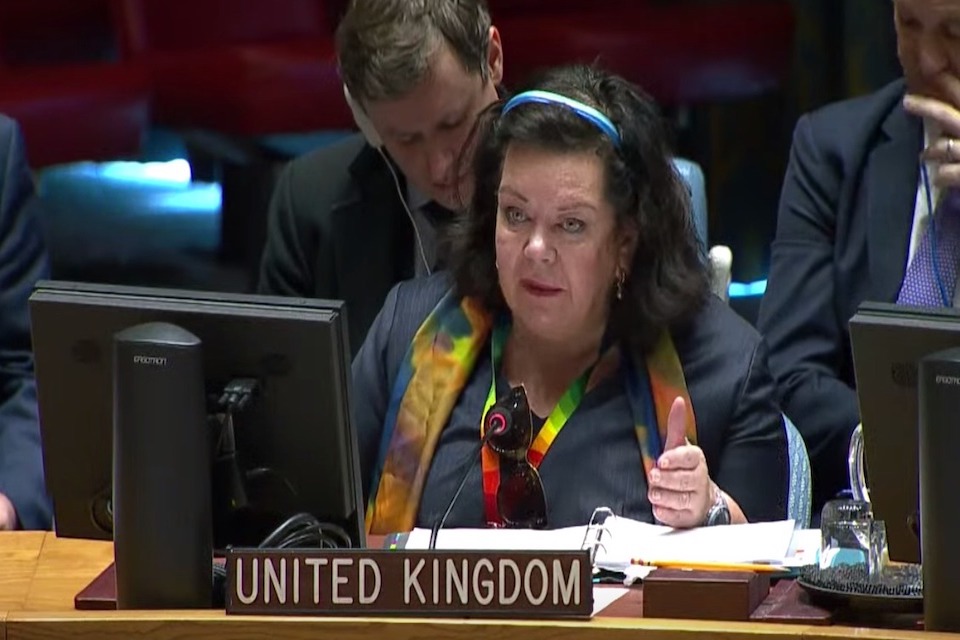Bringing the political process forward in Yemen
Statement by Ambassador Karen Pierce, UK Permanent Representative to the UN, at the Security Council briefing on Yemen.

Thank you very much, Mr President and welcome once again to the Special Envoy and also to the Director. And thank you for both of your briefings and also thank you for your tireless efforts and those of your team on this very acute problem. I think it’s clear from what we’ve heard today that a political settlement is the only way to bring long-term stability to Yemen and also address the humanitarian crisis.
The Security Council, this Council, has a vital role to play in supporting the peace process. And I’d therefore like to begin by welcoming the unanimous adoption of Resolution 2505 on Monday, renewing UNMHA’s mandate.
There’s a number of things I’d like to say, Mr President so I’ll break them down into different headings. On the Riyadh agreement, to start there, we strongly support the Saudi-brokered agreement. It’s vital to stabilising the south and key for an overall peace process. And therefore, the 9 January announcement of a military agreement to make progress on Riyadh, as well as the report of prisoner exchanges is very welcome. And I was interested in what, Martin, you had to say about reconvening the Prisoners Exchange Committee. So let’s hope that that goes well. Announcements do need to be followed by implementation on the ground and the formation of a new Yemeni government is critical to progress.
On de-escalation, I think it is very welcome that there has been a tangible decrease in inflammatory rhetoric and an apparent decrease in violence around the Saudi border. And that’s a good demonstration of political will. The announcement on 20 September that the Houthis would cease strikes on Saudi Arabia is particularly welcome. But obviously that needs to be properly enforced and carried out. And we mustn’t allow this small window of hope to close; I think that’s one message I took away from what you Martin was saying. It’s vital Yemen doesn’t become hostage to a wider regional crisis. And we do hope that the International Community can come together to press the Houthis not to become a vehicle for wider retaliation from Iran in the region.
Ultimately, though, as we know, any sustainable peace process needs to be underpinned by a comprehensive security agreement. And brazen strikes, such as the Iranian missile strike on Aramco last year, place that prize in jeopardy.
On the humanitarian side, Mr President, thank you to the Director for his briefing. I think the core message that stands out there is that this is still the largest humanitarian crisis. And it was alarming to hear that some of the factors that brought Yemen to the brink of famine are returning. So we share OCHA’s sense of urgency on this. We also hope that humanitarian workers can be allowed to do their work properly. And we pay tribute to the work of the humanitarian coordinator and the country team.
What, Martin, you told us about WHO Mercy Flights is obviously extremely important and a bit of good news. I understand there have been intimidation of humanitarian workers and this is not limited to Houthi areas. And I just wanted to take this opportunity to support the statement that the emergency relief coordinator made on 23 December condemning attacks on the premises of several humanitarian organisations in Al-Dhale city in December. Aid workers must be allowed to deliver their lifesaving support in safety.
On the oil tanker, I think we can only echo what the Director said; we do need this issue to be resolved. The consequences of a rupture or explosion are phenomenal. So we urge the Houthis to let the UN assessment team have access to the tanker. Continued inaction can only be described as reckless. So we hope that can be resolved soon.
On the economy, this is obviously a very difficult issue. We continue to encourage constructive engagement on the economy. We look forward to an ongoing injection of hard currency and greater public financial transparency because the problem is the shortfall faced by the Central Bank is extremely concerning and could have serious implications for the humanitarian situation.
To come back to where I started, Mr President, I think all of this is obviously leading up to support for Martin as he tries to take the broader political process forward. But it’s clear from what we’ve heard today that we can’t afford any let-up in our support for that and the Special Envoy’s work.
Thank you.